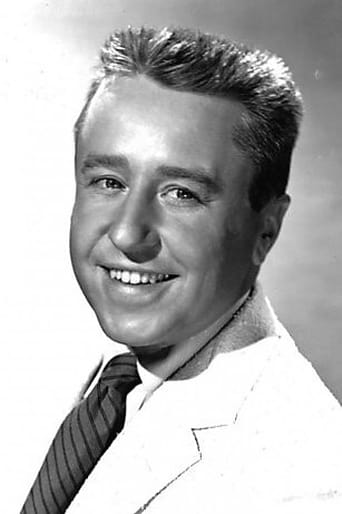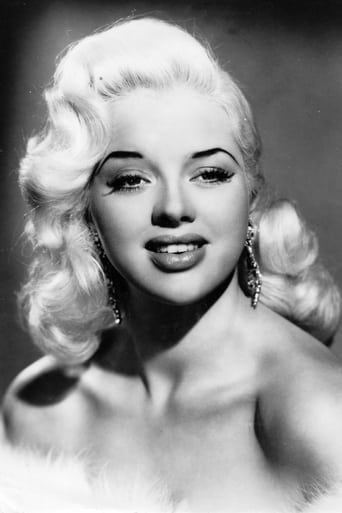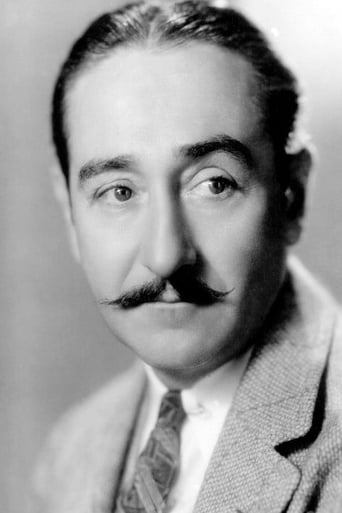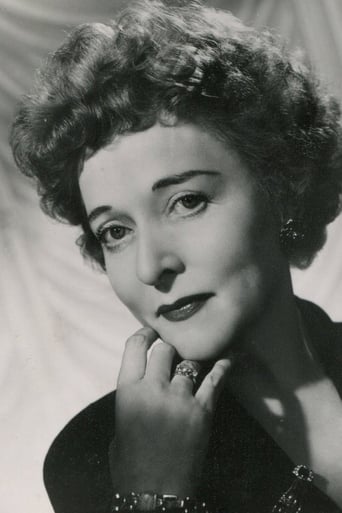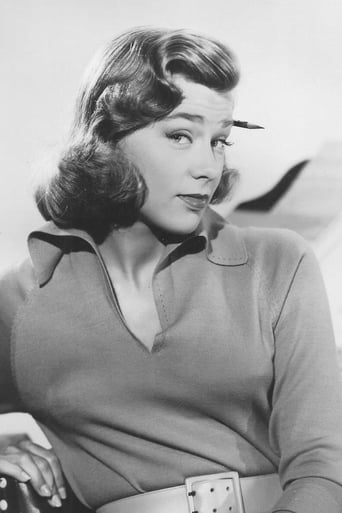Artivels
Undescribable Perfection
SpuffyWeb
Sadly Over-hyped
AnhartLinkin
This story has more twists and turns than a second-rate soap opera.
Candida
It is neither dumb nor smart enough to be fun, and spends way too much time with its boring human characters.
James Hitchcock
"I Married a Woman" was one of two American films made by Diana Dors in 1957/8 during her unsuccessful attempt to conquer Hollywood. (The other was "The Unholy Wife"). Dors' blonde-bombshell looks and voluptuous figure had already made her a big star in Britain, bringing comparisons with Marilyn Monroe, to whom she bore a certain physical resemblance. Success in America therefore seemed assured. Except that it wasn't. Dors' transatlantic adventure got off to a bad start when her husband Dennis Hamilton got into trouble for punching a photographer, there were unsavoury rumours about her sex life and RKO terminated her contract after she began an affair with Rod Steiger, her co-star in "The Unholy Wife", somewhat hypocritically relying upon a so-called "morality clause". Dors was far from being the only film star of the period to have committed adultery, but RKO were highly embarrassed by the bad publicity arising from the photographer incident and wanted any excuse to get rid of her. Their decision was doubtless also influenced by the fact that neither of her films for them was any good; I have never seen "The Unholy Wife", but by all accounts it was an unholy mess, a huge flop with critics and audiences alike.After the failure of "The Unholy Wife", one critic suggested that Dors' next film should be a comedy. This was a common misconception about Dors; most of her best films in Britain were serious dramas such as "Yield to the Night" or "Tread Softly, Stranger", but as her career progressed she found herself increasingly typecast in comedies, to which she was not really suited. This misconception seems to have been rooted in her resemblance not only to Monroe but also to other "blonde bombshells" like Jayne Mansfield and Mamie van Doren, all of whom tended to be comedy specialists. Dors might have been better off trying to become Britain's answer to femmes fatales like Gloria Grahame and Lizabeth Scott rather than the English Marilyn.Nevertheless, someone at the studio took that critic at his word, and the result was "I Married a Woman". The film resembles a television sit- com extended to feature film length. In fact, it resembles a sort of trial run for the sixties sit-com "Bewitched", without the magic. The main characters are a harassed junior executive in an advertising agency (called Mickey rather than Darren), his beautiful blonde wife (called Janice rather than Samantha), his overbearing, mustachioed boss (Mr Sutton rather than Larry Tate) and his impossible mother-in-law, whose name we never learn. (Could it be Endora?)A feature of the film is that it features a cameo by John Wayne as himself. Or rather it features a cameo by John Wayne as he might have been in an alternative universe. In our world Wayne was a rugged action hero, generally admired by male film fans, except the ones who objected to his politics, but less popular with female ones. In the world of the film Wayne has become a romantic matinée idol, a sort of latter-day Rudolph Valentino, adored by women but generally disdained by men. There is a running joke about how Janice always compares Mickey unfavourably with Wayne, whom she sees as the ideal man, loving attentive and sensitive.If the makers of "Bewitched" were indeed inspired by this film, it must be said that this was the sort of creative theft which paid off, resulting in something better than the original. "Bewitched" was highly successful when first broadcast, and still has its devotees today. "I Married a Woman", by comparison, was not a success even in 1958 and today is largely forgotten except perhaps by Wayne completists. (Or Dors completists, if any exist). The difference is that "Bewitched" is a generally good-natured comedy. Darren and Samantha may have their ups and downs, but they love one another, and it is the strength of their love which enables them to overcome all their difficulties.In "I Married a Woman", by contrast, we find it difficult to sympathise with any of the characters, except perhaps with George Gobel's Mickey who wins our sympathy only because he has so many problems to deal with, not because he is particularly likable in himself. Janice is too demanding, and the reason she is so demanding is that she is basically insecure about her marriage. Although she is a beautiful woman married to a rather unattractive man, she is obsessed with the idea that her husband does not love her, and demands that he should behave more like John Wayne. When he does try to be more demonstrative, she misconstrues his gesture of affection. She wrongly suspects him of infidelity on very flimsy evidence- that old "lipstick on your collar" gag gets yet another airing- but can see nothing wrong in trying to arouse his jealousy by pretending to flirt with an old flame. She hides from him the fact that she is pregnant for no apparent reason. The marriage of Darren and Samantha Stephens may be a fit subject for comedy; that of Mickey and Janice Briggs seems more fit for the divorce courts.Larry Tate was a bit of a blusterer, but Adolphe Menjou's Sutton is something worse, the sort of boss who uses rather creepy psychological bullying tactics to "motivate" his employees. Endora may have been a monstrous old witch (in both the literal and metaphorical senses), but Agnes Moorehead played her as so far over the top we knew she was harmless. Janice's whining, self-pitying mother, by contrast, seems rather disturbing because she is realistic enough to put us all in mind of someone we know and dislike. "I Married a Woman" is the sort of comedy which never really works because it can never really reconcile its generally light-hearted tone with the fact that some of its characters display some rather unpleasant sides to their natures. 4/10
Michael Morrison
When the biggest name in Hollywood gets a pivotal role, but is unbilled, there is something unusual happening.It gives away nothing to mention that the great John Wayne plays John Wayne in a movie within the movie, and his movie is color within the black-and-white "I Married A Woman."The other surprise, to me, was the ability demonstrated by George Gobel. I had seen some of his TV shows in some of my TV history classes, and never had the slightest suspicion he was a talented actor as well as variety show host. He's also a very nice-looking guy, even if shorter than his leading lady.In "I Married A Woman" (and what a woman: the gorgeous Diana Dors!), Gobel reminds me a lot of Harry Langdon as the rather hapless and put-upon husband and advertising agency executive.The Duke shows up rather early when the married couple take in a movie, "Forever and Forever and Forever," which would have been a really interesting role for Wayne.That marvelous actor Adolphe Menjou is the ad company boss and is, of course, superb, a delight as always.William Redfield shows strength in a nicely written part of elevator operator and law student. He is so great in this role, I don't understand why he didn't become a big star.Several other major talents and some recognizable faces round out a very capable cast, few of whom are household names today. The directing could have been tighter, but there are no major gaffes or holes; the script was well-enough written, as one would expect from Goodman Ace, but probably can't be considered one of the 100 greatest.Still, "I Married A Woman" is fun and surprising and it has some beauty and warmth. It played on Turner Classic Movies on 18 June 2015. Next time it's presented, I hope you can see it.
marcslope
An alleged comedy starring George Gobel and Diana Dors' cleavage, this TV-style sitcom asks us to believe 1) George would win Diana, 2) they'd live in what looks like a $10 million Manhattan duplex on his salary as a junior ad executive, 3) she would never, never get the chance to tell him she's expecting, which would essentially end the movie, 4) he'd put up with Jessie Royce Landis's endless henpecking (cue the mother-in-law jokes), and 5) the ultimate symbol of screen urbanity, sophistication, and chivalry is… John Wayne. The writing is barely television level, and director Hal Kanter (later a TV mogul, responsible for "Julia" and other notable sitcoms), barely knows where to point the camera. The story's so thin that even at 85 minutes it feels padded. Diana, always good to look at and not an incapable actress, deserved better than this.
bkoganbing
I Married a Woman was made in 1958 at the height of George Gobel's career. George is playing his usual henpecked character from television with an overbearing boss, an interfering mother-in-law, a dissatisfied advertising client and a few other things that make his life an adventure. But if you were married to the statuesque Diana Dors, somehow a lot of those problems would seem small. They don't for Mr. Gobel.Gobel was a very big name in television at this time with a Saturday night variety show for NBC at 10:00 pm. I still remember from my youth the booming TV announcer for NBC announcing their fabulous Saturday night line up of COMO, CAESAR, GOBEL. It was sure superior to NBC's line up now.Watching George Gobel for me is a piece of nostalgia. And looking at the shapely Diana Dors in a tight dress is reason enough itself to watch this film. Gobel's humor doesn't quite translate to the big screen however. You get the feeling you're watching one long skit from his old TV show.One of the gags that doesn't quite work is have John Wayne make an unbilled appearance as Diana Dors's idea of a romantic leading man. Romantic? John Wayne? Wayne makes two appearances in the film. In a movie theater where Gobel and Dors are watching the Duke and Angie Dickinson mouthing some meaningless romantic dialog with the Duke looking quite debonair. I have to believe that this was a gag meant for someone like Cary Grant or Tyrone Power who were great romantics on the screen. The Duke just looks ridiculous doing this. Maybe that in itself was a gag.I'll let you be the judge if you see this film.
